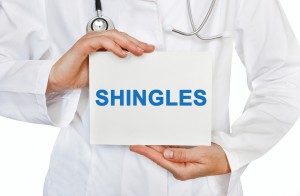What Is Shingles, and Should I Get the Vaccine?
Shingles is an infection caused by the varicella-zoster virus. Anyone who has ever had the chickenpox has the virus in their body. The virus may remain dormant for years until something triggers it. Then a painful rash will appear on the body, causing discomfort for up to several weeks.
 For some people, shingles may begin with a headache or flu-like symptoms. For others, the first sign of shingles is a rash which is usually concentrated in a band or small area of the body. Clusters of painful blisters form along the rash. The blisters are fluid filled and will crust over. The affected area is sometimes so sensitive to touch that even wearing clothing over that area is difficult.
For some people, shingles may begin with a headache or flu-like symptoms. For others, the first sign of shingles is a rash which is usually concentrated in a band or small area of the body. Clusters of painful blisters form along the rash. The blisters are fluid filled and will crust over. The affected area is sometimes so sensitive to touch that even wearing clothing over that area is difficult.
Older adults and people with weakened immune systems are particularly susceptible to developing shingles. However, it can occur at any age. Sometimes shingles can be triggered by certain medications. Many times it is not known what has triggered the virus to become active. It generally takes at least a week for the rash to heal, but people can suffer the affects for many weeks. A painful side effect of shingles is post-herpetic neuralgia (PHN), which lasts for three months or longer.
If you think you may have shingles, you should see your doctor as soon as possible. Antiviral medicines can be prescribed to reduce pain and help the rash to heal more quickly. Blisters that become infected can be treated with antibiotics.
Once a person has been exposed to the varicella-zoster virus, there is no way to completely prevent an occurrence of shingles. A vaccine called Zostavax is recommended for adults ages 60 and over. The vaccine reduces the risk of developing shingles by 51%, and it gives protection for about five years. Most insurance companies will cover the cost of the vaccine for people ages 60 and older. Your doctor can advise if the shingles vaccine is right for you.




